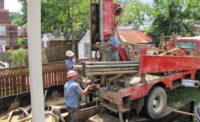The 30 percent residential and 10 percent commercial tax credits that the geothermal industry has received since 2008 have expired.
In December 2015, Congress signed the Consolidated Appropriations Act, which extended the expiration date for PV and solar thermal technologies that were included in the provision, yet failed to extend the credits for geothermal heat pumps, fuel cells, microturbines, small wind, and combined heat and power (CHP) systems.
While several organizations lobbied Congress for an extension, the U.S. House of Representatives failed, again, to extend the geothermal heat pump tax credits via a stopgap spending bill signed Dec. 9, 2016.
“Public policy needs to be rectified; there is an inequity on the tax code,” said Doug Dougherty, president and CEO, Geothermal Exchange Organization (GEO). “Congress has basically picked winners and losers in the same energy space, and there should be similar treatment to [geothermal pumps] to have a level playing field. We will continue to try to convince Congress to pass legislation to extend the tax credit until 2021.”
MOVING ON
Many in the industry believe an extension of the tax credits would help retain jobs, further the growing interest in geothermal heat pumps, and create an even playing field for all technologies.
“This is frustrating,” said Travis Smith, owner, Sky Heating & Air Conditioning, Portland, Oregon. “Geothermal should be on par with solar and wind technologies because it’s a renewable energy. Each geothermal system is the equivalent of taking two cars off of the road. The carbon savings, energy savings, and long-term savings are huge with geothermal. The tax credit helps customers pay for a portion of their loop, since geothermal is often similar in price to a high-efficiency inverter-driven system, but add that cost of the loop in, and it’s often out of reach for many customers.”
Jay Egg, president of Egg Geothermal Consulting, Orlando, Florida, continues to maintain enthusiasm for the benefits geothermal equipment offers the environment and end users. He encourages contractors to identify the key selling points of geothermal and to continue to share them with consumers.
“When I started designing and installing geothermal heating and cooling systems just before 1990, there were no tax credits, but I was, and still am, quite excited about the technology. I would recommend to contractors that you keep your excitement for the technology brimming and make geothermal the first offering every time.”
According to Egg, geothermal is an easy sell, if it is presented appropriately. “Contractors may want to re-align their selling points,” he said. “I’ve found, by and large, folks are tired of being sold the most ‘energy-efficient’ product. I suggest selling on luxury features, as geothermal has them all.”
Egg suggested contractors highlight geothermals many features, including its lack of outdoor equipment, its ability to deliver storm-proof comfort, how it helps to eliminate fresh water consumption from cooling towers, its ability to clear up valuable roof space and other real estate, its ability to eliminate on-site greenhouse gas (GHG) emissions, its exceptional energy efficiency, its longevity, and more.
“Geothermal heating and cooling systems are ‘the masterpieces of HVAC technology.’ As such, geothermal should continue to be our first offering to customers, both commercial and residential. We might be surprised by how easy it is to sell a product that has so many exclusive perks.”
Jon Melchi, vice president of government affairs and business, Heating, Air-conditioning, and Refrigeration Distributors International (HARDI), said the industry may be able to learn from others who have been through a similar change in policy.
“We’ve seen something like this in Canada, where they used to have robust incentives to sell geothermal units, and then those incentives went away. When that occurred, the market there took a dip for a little bit, but then it rebounded. So, really, what we have to do is learn how to market and sell these geothermal products without tax credits. We can’t be dependent on tax credits to sell products. I think it is going to take a refocusing,” said Melchi.
DECELERATED SALES
Some feel the elimination of the tax credits may slow geothermal sales, jobs, and the manufacturing of geothermal technologies.
Don Gillis, territory sales manager, Plumbers Supply Co., Indianapolis, believes things could get worse before they get better.
“The combination of low-cost fossil fuels and inverter technology on heat pumps is causing some confusion for homeowners,” Gillis said. “The only thing contractors can honestly do is to offer the best applications for not only today, but for 10 years from now. I, personally, think the government is sending mixed messages by removing geothermal tax credits.”
Barton James, senior vice president for government relations, ACCA, believes there will be a lull in manufacturing geothermal products and that contractors may have to adjust accordingly.
“On the manufacturing side, they are going to experience a slow reduction using the inventory they have, and sometimes that may take time. For contractors, it may be harder to sell these to customers. The savings are huge, but I, as a customer, need to see the numbers,” said James.
While the elimination of the tax credits is sure to have an impact, we can never know for sure how long or how large this impact could be because market conditions are constantly changing. “The biggest challenge for manufacturers and distributors will be the determination of how much inventory they’ll need to sell these products,” Melchi said. “Again, it’s figuring out a new way that demonstrates the benefits of these products outside of tax incentives.”
Publication date: 1/30/2017
Want more HVAC industry news and information? Join The NEWS on Facebook, Twitter, and LinkedIn today!





